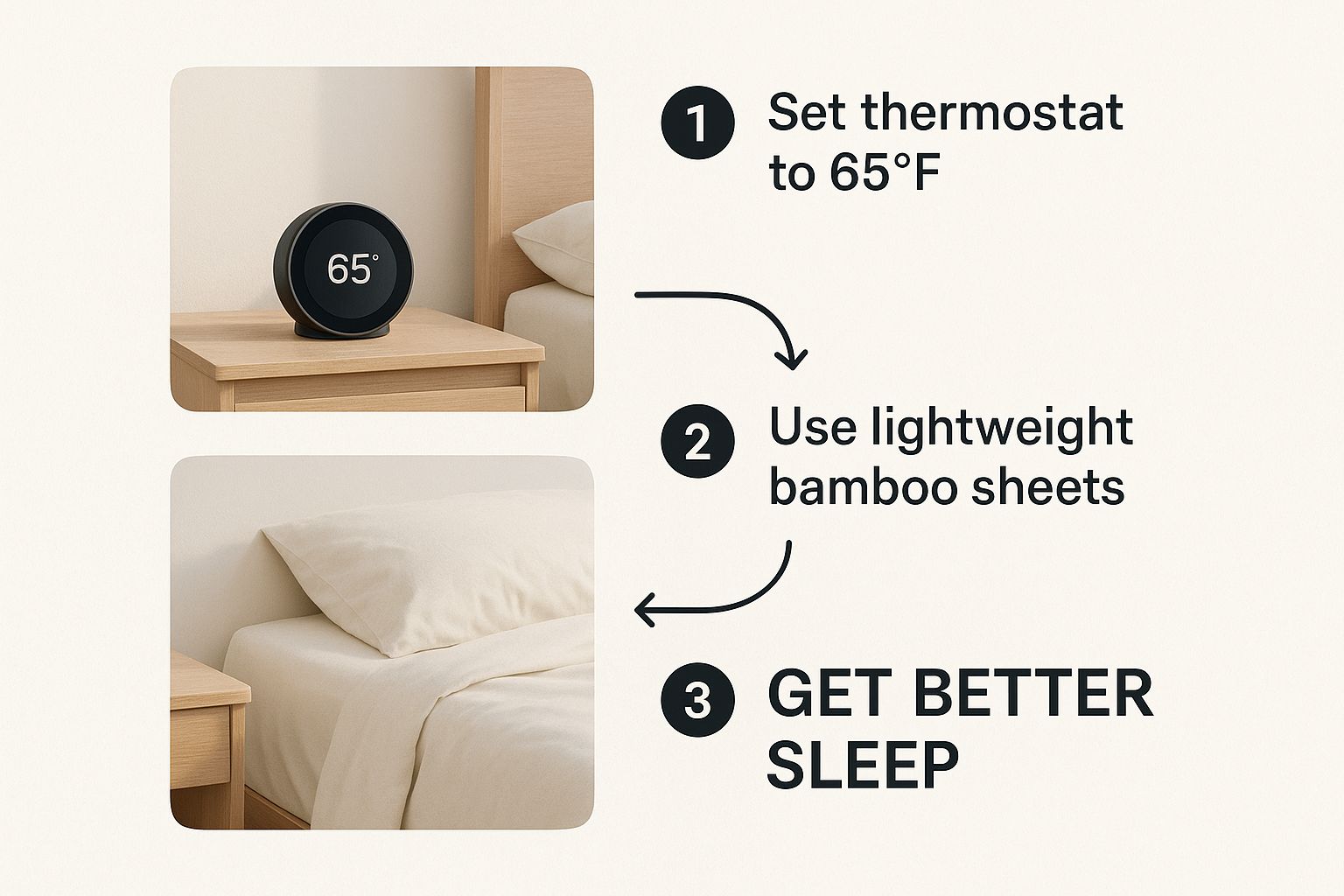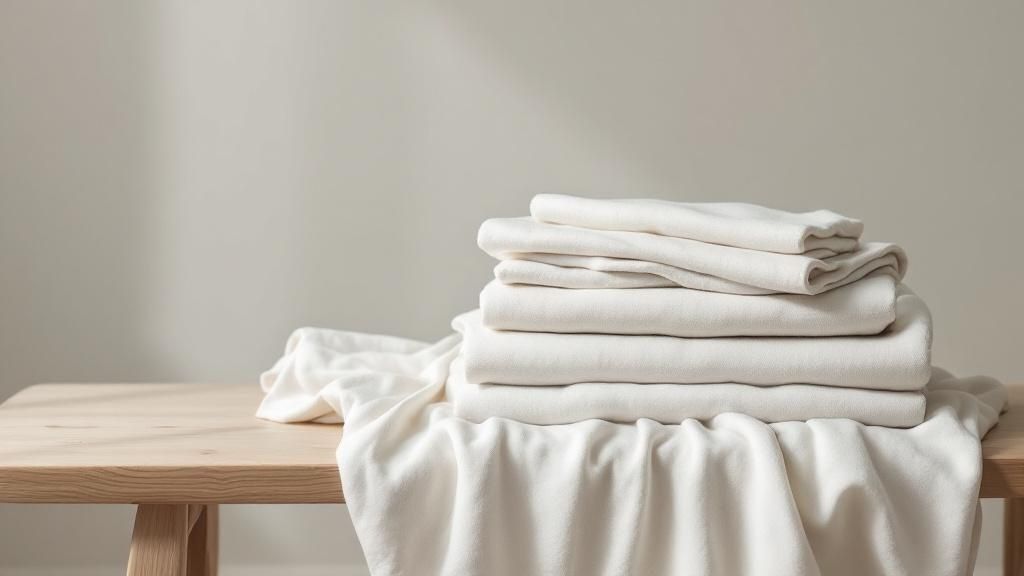Waking up drenched in sweat is more than just an inconvenience; it's a frustrating disruption that can ruin a good night's sleep. To stop it, you first have to figure out why it's happening. Think of these episodes as your body's alarm system—it's trying to tell you that something is out of balance.
Decoding Why You Get Night Sweats
So, what exactly is going on? Night sweats, known in medical circles as sleep hyperhidrosis, happen when your body's internal thermostat goes haywire while you're asleep. This isn't the same as getting a bit warm under the covers. We're talking about intense, soaking sweats that leave your pajamas and sheets damp.
The problem often starts in your hypothalamus, the part of your brain that acts as your body's temperature control center. When it senses a threat or an imbalance, it can overreact and trigger a full-body cool-down, even when you don't actually need it.
If you’re experiencing this, you're far from alone. Studies have shown that night sweats are quite common, affecting up to 41% of people in primary care settings, especially those between the ages of 41 and 55. The wide range of causes, from health conditions to simple lifestyle factors, means it's an issue that touches many lives. You can read the full research about these findings for a deeper dive into the data.
Common Triggers Behind Your Night Sweats
To help you start connecting the dots, I've put together a table that breaks down the most frequent culprits. It’s a great starting point for seeing what might be affecting you.
Common Triggers Behind Your Night Sweats
| Category of Cause | Common Examples |
|---|---|
| Hormonal Changes | Menopause, perimenopause, pregnancy, postpartum, and even monthly cycle shifts. |
| Medications | Certain antidepressants, steroids, and some pain relievers can have this side effect. |
| Stress & Anxiety | High cortisol and adrenaline levels from stress can activate your sweat glands at night. |
| Diet & Lifestyle | Spicy foods, caffeine, or alcohol too close to bedtime can raise your body temperature. |
| Health Conditions | Infections, thyroid issues (like hyperthyroidism), and sleep apnea are known causes. |
Looking at this list, you can see just how varied the causes are. It often takes a little self-investigation to pinpoint your specific trigger.
Hormonal imbalances are a major player here, and it's worth noting that our environment can sometimes make things worse. Everyday chemicals can interfere with our body's natural hormone function. If you're curious about this connection, you can learn more about endocrine disruptors.
The most important thing to remember is that night sweats are a symptom, not a disease. They are your body's way of signaling that something—whether it's your hormones, your stress levels, or even what you had for dinner—is disrupting its natural rhythm. The first step toward a cooler, more peaceful night is learning to listen to that signal.
Engineer Your Bedroom for Cooler Sleep
Your bedroom environment can be your greatest ally—or your worst enemy—when it comes to night sweats. It’s not just about cranking down the AC. Think of it more like creating a personal sleep sanctuary, one that’s actively designed to keep you cool and dry all night long.
The first place I always tell people to look is their bedding. You're wrapped in it for hours, and if it's made from heat-trapping synthetics like polyester, you're essentially sleeping in an incubator. The goal is to switch to materials that breathe and wick moisture away from your body.

As you can see, a cooler room is a great start, but what you put on your bed makes a huge difference in managing your temperature while you sleep.
Optimize Your Sleep Environment
To get ahead of night sweats, the fabrics you surround yourself with are critical. Natural fibers are almost always the superior choice.
- Pick Breathable Bedding: You can't go wrong with linen, cotton, or especially bamboo. Bamboo sheets are fantastic for their natural thermoregulating properties, which genuinely help keep you comfortable no matter the season. We go into more detail in our guide on why https://bamtekhome.com/blogs/bamboo-sheets-a-cool-and-eco-friendly-choice-for-hot-sleepers.
- Layer Up (The Smart Way): Ditch the one-and-done heavy comforter. Instead, try using a few lighter layers. If you get too warm, you can just peel one back without a major disruption.
- Get the Air Moving: A simple ceiling or standing fan can be a game-changer. Just a gentle breeze circulating over your bed helps sweat evaporate from your skin before it has a chance to soak your sheets.
Think of your bedroom as your first line of defense. The aim is to create an environment where your body doesn't even feel the need to sweat to cool itself down.
What you wear to bed is just as crucial as what you sleep on. Don't overlook your pajamas. Investing in high-quality, moisture-wicking sleepwear or even specialized sweat-proof underwear can provide an extra layer of protection and comfort.
This becomes especially important as the seasons change. In fact, research shows that the likelihood of experiencing night sweats can jump by as much as 50% during warmer months like June. It's a real phenomenon, and preparing your sleep space ahead of time can make all the difference.
Lifestyle Tweaks That Make a Real Difference

It’s easy to overlook, but your daily habits often have the biggest impact on whether you wake up drenched in sweat. I've found that making a few small, conscious adjustments to your routine can dramatically reduce how often you wake up overheated and uncomfortable. It really starts with what you're doing in the hours before your head hits the pillow.
That late-night spicy meal or even a single glass of wine might seem harmless, but they can be major culprits. These things can elevate your core body temperature, basically cranking up your internal furnace right when you're trying to cool down for sleep.
Adjust Your Evening Habits
To get a handle on night sweats, it helps to build a deliberate "cool-down" period into your evening. This isn't about a massive life overhaul, but rather a few smart changes to your pre-sleep ritual.
Here are a few things I always recommend:
- Watch What You Eat and Drink: Try to avoid spicy foods, caffeine, and alcohol for at least three hours before bed. These are well-known triggers that can throw your internal thermostat out of whack.
- Time Your Workouts: Daily exercise is fantastic for your body, but an intense session too close to bedtime can leave your body temperature elevated for hours. It’s best to wrap up any vigorous activity a few hours before you plan to sleep.
- Take a Cool-Down Shower: A lukewarm or cool shower just before bed is a simple trick that works wonders. It lowers your surface skin temperature, giving you immediate relief and sending a clear signal to your body that it's time to rest.
The goal here isn't perfection overnight. It's about finding those small, manageable triggers and making smart swaps that set the stage for a much more comfortable and dry night's sleep.
We also can't ignore stress. When you're feeling wound up, your body releases hormones that can directly activate your sweat response. Of course, waking up in a sweat often ruins your sleep, creating a frustrating cycle of insomnia. Looking into natural approaches like herbal remedies for insomnia can be a huge help.
Even something as simple as a 10-minute mindfulness or deep breathing exercise before bed can be incredibly effective at calming your nervous system and keeping those stress-induced sweats from happening.
How to Handle Night Sweats During Menopause

For so many women, menopause brings a very unwelcome visitor: intense, sleep-disrupting night sweats. These sudden episodes of heat, clinically known as vasomotor symptoms (VMS), are a classic sign of this life stage, all thanks to some major hormonal changes happening behind the scenes.
As your body enters menopause, estrogen levels start to decline. This dip can throw your brain's internal thermostat—the hypothalamus—for a loop. It mistakenly thinks you're overheating and triggers a full-body cooldown, leading to those frustrating hot flashes and drenching sweats, even when you're perfectly comfortable.
If this sounds familiar, you're in good company. Research shows that about 57% of women between 40 and 64 experience these symptoms, with many enduring an average of three separate episodes every single night. But here's the surprising part: despite how disruptive this can be, nearly 40% of women with severe symptoms never talk to a doctor about it, often believing it's just something they have to suffer through. You can see the full research on VMS prevalence here.
Taking Back Your Nights: Talking to Your Doctor
The most important thing to remember is that you don't have to just "tough it out." The single best step you can take is to discuss how to stop night sweats with your healthcare provider. They can walk you through options that are right for your body and health history.
Your conversation will likely explore a few different avenues for relief:
-
Hormone Replacement Therapy (HRT): This is often the first-line defense and one of the most effective treatments. HRT helps by topping up the estrogen your body is missing, which can significantly reduce or even eliminate night sweats.
-
Non-Hormonal Medications: If HRT isn't a good fit for you, don't worry. There are other prescription drugs that have proven effective at managing VMS without involving hormones.
-
Evidence-Backed Supplements: Some women get good results from supplements like black cohosh. However, it's absolutely vital to discuss these with your doctor first to make sure they're safe for you and won't interfere with other medications.
Feeling confident and prepared for this appointment makes all the difference. Try to track your symptoms beforehand and come with a list of questions. The goal is to partner with your doctor to find a solution that helps you finally get a good night's sleep.
Working with a professional is the surest way to find relief. For more strategies to get through this challenging time, you can find more of our tips on navigating the night when sleep just won't come easily.
Knowing When to See Your Doctor
Most of the time, night sweats are just a frustrating part of life that you can manage with a few simple tweaks. But how do you know when it's just an annoyance versus a sign that you should book a doctor's appointment? Think of it this way: you're the best advocate for your own health, and learning to spot the difference is a powerful skill.
If you occasionally wake up a bit damp because the thermostat was set too high or you had a heavy blanket, that's completely normal. But if you're waking up night after night completely drenched, and nothing you do seems to help, it's probably time to have a chat with your doctor.
Red Flags to Take Seriously
The real signal to pay attention to is when night sweats aren't happening on their own. When they show up with a few other unexplained symptoms, that's your body's way of telling you to get things checked out.
Keep an eye out for these specific warning signs:
- Unexplained Weight Loss: Dropping pounds when you haven't changed a thing about your diet or fitness routine.
- Persistent Fever: A constant, low-grade fever that just won't go away or keeps coming back.
- Swollen Glands: Finding new or tender lumps in your neck, armpits, or groin.
- A Stubborn Cough: A cough or shortness of breath that hangs around for weeks.
When these symptoms appear together, they can sometimes point to underlying issues like infections or thyroid problems that a doctor needs to diagnose. A quick visit and maybe a few simple tests can give you the answers and peace of mind you need.
This isn't about causing alarm—it's about being proactive. Knowing your body and recognizing when something is off is one of the best things you can do for your health.
A professional can help you get to the root cause and rule out anything serious. While you're figuring things out, focusing on comfort can make a huge difference. For many people, simply switching to better bedding is a game-changer. We've put together a guide with some fantastic options to help you find the best sheets for hot flashes.
Your Questions About Night Sweats Answered
Even after you've learned about the potential triggers and solutions, you probably still have some specific questions about dealing with night sweats. It's completely normal. I've pulled together some of the most common questions I hear to give you clear, straightforward answers and help you get a handle on things.
Can Stress and Anxiety Really Cause Night Sweats?
Yes, they absolutely can. When you're stressed or anxious, your body kicks into its "fight or flight" mode. This process unleashes stress hormones like adrenaline and cortisol, which can crank up your internal temperature and fire up your sweat glands, even while you’re fast asleep.
Making some simple relaxation practices part of your bedtime routine can be a game-changer. Things like deep breathing exercises or a quick meditation session right before bed can help settle your nervous system and stop those stress-induced sweats before they even start.
What Specific Foods Should I Avoid?
A few usual suspects are notorious for turning up the heat. Spicy foods, caffeine, and alcohol are the big three, as they can either directly raise your body temperature or mess with your body's ability to regulate it.
As a practical guideline, try to steer clear of these triggers for at least three hours before bedtime. Eating a large, rich meal too close to sleep can also rev up your metabolism, generating extra heat that often leads to uncomfortable sweating.
Do Over-the-Counter Products for Night Sweats Work?
It really comes down to the product you're looking at. For quick relief, things that change your sleep environment are often the most effective.
- Cooling Pillows: These are great for drawing heat away from your head and neck.
- Moisture-Wicking Pajamas: They pull sweat off your skin, helping you feel much drier and more comfortable.
- Specialized Mattress Toppers: Many are now made with cooling gels or other breathable materials designed to prevent heat buildup.
On the other hand, when you look at supplements like black cohosh or red clover, the results tend to be mixed. What works wonders for one person might do nothing for another. It’s always best to have a chat with your doctor before starting any new supplement to make sure it's a safe and smart choice for your specific situation.
Can Dehydration Cause Night Sweats?
This is a very common misconception. While dehydration doesn't actually cause night sweats, the reverse is definitely true—waking up drenched in sweat night after night can easily lead to dehydration if you aren't careful.
If you're dealing with regular night sweats, you have to be intentional about replacing those lost fluids. Make it a point to drink plenty of water all day long to stay properly hydrated.
For a truly dry and comfortable night's sleep, the right bedding makes all the difference. At Bamtek, we make our sheets from 100% organic bamboo viscose, a material celebrated for its natural ability to regulate temperature and wick away moisture. Discover how our soft, breathable bedding can help you stay cool and comfortable from dusk till dawn.










